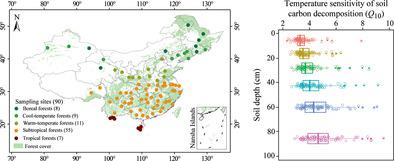Our official English website, www.x-mol.net, welcomes your
feedback! (Note: you will need to create a separate account there.)
Rising Temperature May Trigger Deep Soil Carbon Loss Across Forest Ecosystems
Advanced Science ( IF 14.3 ) Pub Date : 2020-08-06 , DOI: 10.1002/advs.202001242 Jinquan Li 1 , Junmin Pei 1 , Elise Pendall 2 , Peter B Reich 2, 3 , Nam Jin Noh 2, 4 , Bo Li 1 , Changming Fang 1 , Ming Nie 1
Advanced Science ( IF 14.3 ) Pub Date : 2020-08-06 , DOI: 10.1002/advs.202001242 Jinquan Li 1 , Junmin Pei 1 , Elise Pendall 2 , Peter B Reich 2, 3 , Nam Jin Noh 2, 4 , Bo Li 1 , Changming Fang 1 , Ming Nie 1
Affiliation

|
Significantly more carbon (C) is stored in deep soil than in shallow horizons, yet how the decomposition of deep soil organic C (SOC) will respond to rising temperature remains unexplored on large scales, leading to considerable uncertainties to predictions of the magnitude and direction of C‐cycle feedbacks to climate change. Herein, short‐term temperature sensitivity of SOC decomposition (expressed as Q10) from six depths within the top 1 m soil from 90 upland forest sites (540 soil samples) across China is reported. Results show that Q10 significantly increases with soil depth, suggesting that deep SOC is more vulnerable to loss with rising temperature in comparison to shallow SOC. Climate is the primary regulator of shallow soil Q10 but its relative influence declines with depth; in contrast, soil C quality has a minor influence on Q10 in shallow soil but increases its influence with depth. When considering the depth‐dependent Q10 variations, results further show that using the thermal response of shallow soil layer for the whole soil profile, as is usually done in model predictions, would significantly underestimate soil C‐climate feedbacks. The results highlight that Earth system models need to consider multilayer soil C dynamics and their controls to improve prediction accuracy.
更新日期:2020-10-07











































 京公网安备 11010802027423号
京公网安备 11010802027423号